Well, I think mr Erdoğan's “kind words” about Finland and Sweden are not unexpected. Mr Erdoğan is not only a dictator, but also an international blackmailer. He isn't much different from Putin: he uses the strategic position of Turkey just like Putin uses his gas and natural resources. He's definitely a criminal and a terrorist, but a criminal in the OTAN and his blackmail on Finland and Sweden, which are so eager to enter OTAN and renounce their historical neutrality, is a dilemma for both. What to do? You want to become OTAN members? Well, give us back our Kurds you so kindly protect in your Putin-frightened countries, we'll exterminate them, and then you can become members of anything you want. This is very simple and, I repeat, not at all unexpected. Now, you have to choose, and your choice could be very harmful to people who sought for refuge in you countries against death and/or lifelong... (continuer)
Riccardo Venturi 18/5/2022 - 21:59

Texten till den här låten är baserad på rader skrivna av Nâzım Hikmet i hans självbiografiska roman Yaşamak Güzel Şey Be Kardeşim från 1962. Romanen är översatt till engelska av Mutlu Konuk Blasing och publicerad 2013 under titeln Life's Good, Brother.
Under större delen av sitt liv var Hikmet förföljd av den turkiska staten för sin politiska övertygelse. Hans verk var förbjudna i Turkiet fram till 1965. 2017, 59 år efter Hikmets död, publicerades Yaşamak Güzel Şey Be Kardeşim av förlagshuset Yapı Kredi, den nuvarande ägaren av Hikmets upphovsrätt. Den nya upplagan innehåller totalt 25 censurerade textställen. Censuren har till exempel förandrat »jag är kommunist« till »jag är arbetare«. Så tack, herr Erdoğan, för detta och för ditt vänliga uttalande om Finland och Sverige häromdagen.
Under större delen av sitt liv var Hikmet förföljd av den turkiska staten för sin politiska övertygelse. Hans verk var förbjudna i Turkiet fram till 1965. 2017, 59 år efter Hikmets död, publicerades Yaşamak Güzel Şey Be Kardeşim av förlagshuset Yapı Kredi, den nuvarande ägaren av Hikmets upphovsrätt. Den nya upplagan innehåller totalt 25 censurerade textställen. Censuren har till exempel förandrat »jag är kommunist« till »jag är arbetare«. Så tack, herr Erdoğan, för detta och för ditt vänliga uttalande om Finland och Sverige häromdagen.
JAG ÄR KOMMUNIST
(continuer)
(continuer)
envoyé par Juha Rämö 18/5/2022 - 22:21
Not unexpected but a little bit surprising since my guess was that the first one to make a hearty statement like this would be Mr. Orbán, the great leader of our brother nation Hungary, who has openly declared to be a close friend to Mr. Putin, the great leader of our eastern neighbor Russia whose existence is currently threatened by the hords of Ukrainian Nazis.
Juha Rämö 18/5/2022 - 22:48
Hello everybody,
Could someone please submit the original Turkish lines of this poem from the novel Yaşamak Güzel Şey Be Kardeşim? Due to my non-existing Turkish skills I'm unable to trace them myself.
Sincerely yours,
Juha Rämö
Could someone please submit the original Turkish lines of this poem from the novel Yaşamak Güzel Şey Be Kardeşim? Due to my non-existing Turkish skills I'm unable to trace them myself.
Sincerely yours,
Juha Rämö
Juha Rämö 16/11/2024 - 12:22
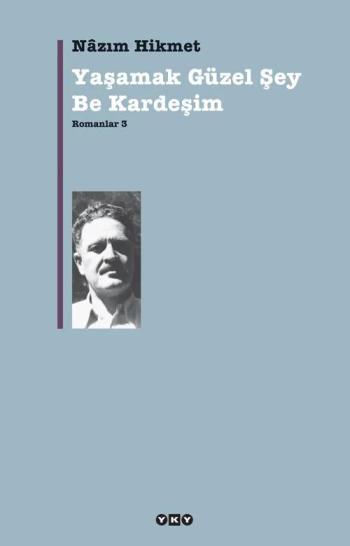
Komünistim (from Nâzım Hikmet's Yaşamak Güzel Şey Be Kardeşim ("Life is a Beautiful Thing, my Brother", 1962)
--> Fonte / Source
--> Fonte / Source
Komünistim,
(continuer)
(continuer)
envoyé par Riccardo Venturi 16/11/2024 - 19:33
Riccardo Venturi, 16-11-2024
Pubblicato nel 1962, un anno prima della sua morte in esilio a Mosca, e a tutt'oggi inedito in Italia, "Gran bella è cosa vivere, miei cari" è un romanzo la cui gestazione ha accompagnato gran parte della vita di Hikmet. Pur essendo un'opera di fiction, le vicende che Hikmet racconta sono attinte dalla sua biografia: sua è la voce del narratore, Ahmet, un uomo morso da un cane rabbioso che attende la fine del periodo di incubazione isolato in una capanna dell'Anatolia lasciandosi andare alle intermittenze della memoria e del cuore; sua è anche la voce di quell'io che gli si alterna, in un sublime gioco di proiezioni e riflessi narrativi; suo è il "materiale di vita" che vi si accumula, gli squarci dell'infanzia, i momenti di attivismo politico, le sofferenze dell'esilio.
Sono comunista
(continuer)
(continuer)
Riccardo Venturi, 16-11-2024 20:10
Sono comunista (continuer)
Riccardo Venturi, 16-11-2024
I am a communist
(continuer)
(continuer)
@ Juha Rämö
Hello Juha! As you can see, I have added Nâzım Hikmet’s original verses in Turkish from his novel “Life is a Beautiful Thing, my Brother!” (1962). I have also added an Italian translation and an English translation of N.H.’s verses. The English translation you submitted to this site is a rather free and poetical version. The Turkish poem is much simpler. Note: I have translated “sevda” as “love”, but this is rather a verbal noun and, maybe, a better translation could be: “loving”.
See you, and thanks!
Hello Juha! As you can see, I have added Nâzım Hikmet’s original verses in Turkish from his novel “Life is a Beautiful Thing, my Brother!” (1962). I have also added an Italian translation and an English translation of N.H.’s verses. The English translation you submitted to this site is a rather free and poetical version. The Turkish poem is much simpler. Note: I have translated “sevda” as “love”, but this is rather a verbal noun and, maybe, a better translation could be: “loving”.
See you, and thanks!
Riccardo Venturi 16/11/2024 - 20:47
@ Riccardo Venturi
Dear Riccardo,
Thank you very much for the original Turkish verses by Nâzım Hikmet. The Finnish songtext by Brita Polttila undoubtedly differs from the original Turkish lines. The contents are there, but the structure is different as is that of my English and Swedish translations. I wonder if this page should be restructured by replacing Olen kommunisti with Hikmet’s original verses and adding the rest of the page content as translations of the two. I don’t know if Hikmet’s text has been set to music, though.
Could you please replace the introduction of my contribution with the following:
Traduzione inglese dei versi di Nâzım Hikmet / English translation of Nâzım Hikmet's verses / Traduction anglaise des verses de Nâzım Hikmet / Nâzım Hikmetin säkeiden englanninkielinen käännös: Mutlu Konuk Blasing
Yours sincerely,
Juha
Dear Riccardo,
Thank you very much for the original Turkish verses by Nâzım Hikmet. The Finnish songtext by Brita Polttila undoubtedly differs from the original Turkish lines. The contents are there, but the structure is different as is that of my English and Swedish translations. I wonder if this page should be restructured by replacing Olen kommunisti with Hikmet’s original verses and adding the rest of the page content as translations of the two. I don’t know if Hikmet’s text has been set to music, though.
Could you please replace the introduction of my contribution with the following:
Traduzione inglese dei versi di Nâzım Hikmet / English translation of Nâzım Hikmet's verses / Traduction anglaise des verses de Nâzım Hikmet / Nâzım Hikmetin säkeiden englanninkielinen käännös: Mutlu Konuk Blasing
Yours sincerely,
Juha
Juha Rämö 17/11/2024 - 11:19
@ Juha Rämö
First of all, a service communication: my old mailbox is no longer available. My new e-mail address is: info.riccardoventuri@protonmail.com. Please use it for all purposes.
I have replaced the introduction of your contribution. As for your proposal to modify this page according to Nâzım Hikmet’s original Turkish verses, I did some research and found that they have never been set to music and/or sung. Apart from this, I think this page is and should remain dedicated to a Finnish song written by Brita Polttila and performed by Agit Prop, although based on Hikmet's verses included in his novel. In practice, it is the same case as Pete Seeger’s well known I Come and Stand at Every Door, which is also based on a poem by Nâzım Hikmet. Of course, no page of this website is definitive; but, for the moment, I prefer that this page remains as it is, i.e. focused on a Finnish song.
By the way, I wonder if perhaps it would be better to attribute the song to Agit-Prop. Please let me know what you think.
Best regards, RV
First of all, a service communication: my old mailbox is no longer available. My new e-mail address is: info.riccardoventuri@protonmail.com. Please use it for all purposes.
I have replaced the introduction of your contribution. As for your proposal to modify this page according to Nâzım Hikmet’s original Turkish verses, I did some research and found that they have never been set to music and/or sung. Apart from this, I think this page is and should remain dedicated to a Finnish song written by Brita Polttila and performed by Agit Prop, although based on Hikmet's verses included in his novel. In practice, it is the same case as Pete Seeger’s well known I Come and Stand at Every Door, which is also based on a poem by Nâzım Hikmet. Of course, no page of this website is definitive; but, for the moment, I prefer that this page remains as it is, i.e. focused on a Finnish song.
By the way, I wonder if perhaps it would be better to attribute the song to Agit-Prop. Please let me know what you think.
Best regards, RV
Riccardo Venturi 17/11/2024 - 12:06
@ Riccardo Venturi
Thanks for your new E-mail address. I don't mind attributing the song to Agit Prop. They definitely deserve it.
Cheers,
Juha
Thanks for your new E-mail address. I don't mind attributing the song to Agit Prop. They definitely deserve it.
Cheers,
Juha
Juha Rämö 18/11/2024 - 10:30
Riccardo Venturi, 18-11-2024 20:27
Jag är kommunist
(continuer)
(continuer)
Laulu II Maailmansodasta
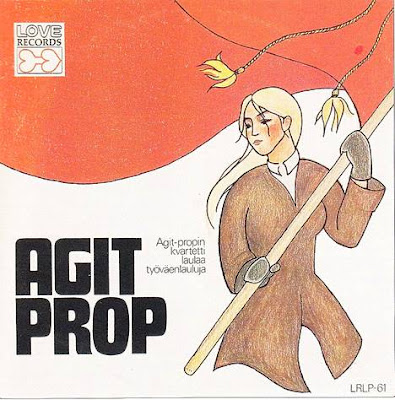
[1972]
Testo / Lyrics / Paroles / Sanat: Raija Laroma
Musica / Music / Musique / Sävel: Heikki Valpola
Album / Albumi: Agit-Propin kvartetti laulaa työväenlauluja
L’intera II guerra mondiale raccontata in una canzone? Ebbene sì. O meglio: almeno una parte della II guerra mondiale; ma non è comunque poco. Poiché gli Agit-Prop erano un quartetto non solo dichiaratamente comunista, ma anche espressione diretta del Partito Comunista Finlandese -e su questo torneremo in seguito), è lecito attendersi una canzone assolutamente ortodossa dal punto di vista storico: il suo testo, scritto dalla scrittrice Raija Laroma, è un’enunciazione puntuale dei dettami storici ufficiali di provenienza sovietica, il tutto su una musica cadenzata (composta da Heikki Valpola) di sentore Brechtiano (o meglio, Eisleriano). Ciononostante, vi sono espressi alcuni concetti innegabili, così come ve ne sono scrupolosamente... (continuer)
Testo / Lyrics / Paroles / Sanat: Raija Laroma
Musica / Music / Musique / Sävel: Heikki Valpola
Album / Albumi: Agit-Propin kvartetti laulaa työväenlauluja
L’intera II guerra mondiale raccontata in una canzone? Ebbene sì. O meglio: almeno una parte della II guerra mondiale; ma non è comunque poco. Poiché gli Agit-Prop erano un quartetto non solo dichiaratamente comunista, ma anche espressione diretta del Partito Comunista Finlandese -e su questo torneremo in seguito), è lecito attendersi una canzone assolutamente ortodossa dal punto di vista storico: il suo testo, scritto dalla scrittrice Raija Laroma, è un’enunciazione puntuale dei dettami storici ufficiali di provenienza sovietica, il tutto su una musica cadenzata (composta da Heikki Valpola) di sentore Brechtiano (o meglio, Eisleriano). Ciononostante, vi sono espressi alcuni concetti innegabili, così come ve ne sono scrupolosamente... (continuer)
Monesta murhenäytelmästä kertoo ihmiskunnan historia.
(continuer)
(continuer)
envoyé par Riku Venturinen 20/3/2024 - 00:51

Riccardo Venturi, 20-3-2024 00:55
Canzone sulla II Guerra mondiale
(continuer)
(continuer)
Dear Admin,
The Finnish lyrics contain a humorous mistake. In the fourth line from bottom, it reads purkka-armeija which in English is bubblegum army. The correct Finnish word is hurtta-armeija, an army of bloodhounds. I have corrected this and a couple of other mistakes. I would be grateful if you replaced the existing Finnish lyrics with the ones below.
Thanks a lot,
JR
The Finnish lyrics contain a humorous mistake. In the fourth line from bottom, it reads purkka-armeija which in English is bubblegum army. The correct Finnish word is hurtta-armeija, an army of bloodhounds. I have corrected this and a couple of other mistakes. I would be grateful if you replaced the existing Finnish lyrics with the ones below.
Thanks a lot,
JR
Juha Rämö 20/3/2024 - 13:46
@ Juha Rämö
Dear Juha, I noticed this rather curious expression, “purkka-armeija”. You call it humorous, but still more humorous is that I took it for some lively Finnish idiom, God knows what I have in my mind sometimes -something that explodes like bubblegum, or makes things and persons explode like bubblegum. So I translated “L’esercito distruttore” in my Italian translation. Now I wonder how many lyrics sites must contain the same error! :-)
Dear Juha, I noticed this rather curious expression, “purkka-armeija”. You call it humorous, but still more humorous is that I took it for some lively Finnish idiom, God knows what I have in my mind sometimes -something that explodes like bubblegum, or makes things and persons explode like bubblegum. So I translated “L’esercito distruttore” in my Italian translation. Now I wonder how many lyrics sites must contain the same error! :-)
Riku Ventturinen 20/3/2024 - 17:26
@ Riku V.
Dear Riccardo,
The colloquial word purkka exists in Finnish in two meanings:
- short for purukumi, chewing gum
- short for purukumipop, bubblegum music
I haven't checked, but I could bet all the lyrics sites contain the same error.
Dear Riccardo,
The colloquial word purkka exists in Finnish in two meanings:
- short for purukumi, chewing gum
- short for purukumipop, bubblegum music
I haven't checked, but I could bet all the lyrics sites contain the same error.
Juha Rämö 20/3/2024 - 19:18
@ Juha Rämö
And I bet there must be some English translation of the song where the Wehrmacht is labelled as a bubblegum army. Btw, I see there's a correct English translation provided by Lyricstranslate, with its army of bloodhounds. That's my fault, I could have checked better but now I prefer translating directly from Finnish, possibly without help of other translations. I know this is a form of self-pride, but I'm afraid this will lead me to other humorous situations.
And I bet there must be some English translation of the song where the Wehrmacht is labelled as a bubblegum army. Btw, I see there's a correct English translation provided by Lyricstranslate, with its army of bloodhounds. That's my fault, I could have checked better but now I prefer translating directly from Finnish, possibly without help of other translations. I know this is a form of self-pride, but I'm afraid this will lead me to other humorous situations.
Riccardo Venturi 20/3/2024 - 20:20
Köyhien toivo

[1972]
Testo / Lyrics / Paroles / Sanat: Kaj Chydenius
Canta / Singer / Chante / Laulaa: Miia Vuokkonen
Album / Albumi: Agit-prop -kvartetti laulaa työväenlauluja
(Agit-Prop Quartet sings Working Class Songs
Il Quartetto Agit-Prop canta canzoni dei lavoratori)
Testo / Lyrics / Paroles / Sanat: Kaj Chydenius
Canta / Singer / Chante / Laulaa: Miia Vuokkonen
Album / Albumi: Agit-prop -kvartetti laulaa työväenlauluja
(Agit-Prop Quartet sings Working Class Songs
Il Quartetto Agit-Prop canta canzoni dei lavoratori)
Te ootte jo kyllin kestäneet
(continuer)
(continuer)
envoyé par Riccardo Venturi 11/3/2024 - 22:44

Riccardo Venturi (Riku Ventturinen), 11-3-2024 22:45
La speranza dei poveri
(continuer)
(continuer)
Vietnamissa, Vietnamissa

[1972]
Sävel / Musica / Music / Musique: Kaj Chydenius
Sanat / Testo / Lyrics / Paroles: Aulikki Oksanen
Album / Albumi: Agit-prop -kvartetti laulaa työväenlauluja
(Agit-Prop Quartet sings Working Class Songs
Il Quartetto Agit-Prop canta canzoni dei lavoratori)
Sävel / Musica / Music / Musique: Kaj Chydenius
Sanat / Testo / Lyrics / Paroles: Aulikki Oksanen
Album / Albumi: Agit-prop -kvartetti laulaa työväenlauluja
(Agit-Prop Quartet sings Working Class Songs
Il Quartetto Agit-Prop canta canzoni dei lavoratori)
Vietnamissa, Vietnamissa
(continuer)
(continuer)
envoyé par Riku Ventturinen 10/3/2024 - 23:17
Riccardo Venturi, 10-3-2024 23:19
In Vietnam, in Vietnam
(continuer)
(continuer)
@ Juha Rämö
Dear Juha, I have integrated the corrected lyrics and authorship data into the page. Thank you a lot!
Dear Juha, I have integrated the corrected lyrics and authorship data into the page. Thank you a lot!
Riccardo Venturi 11/3/2024 - 20:00
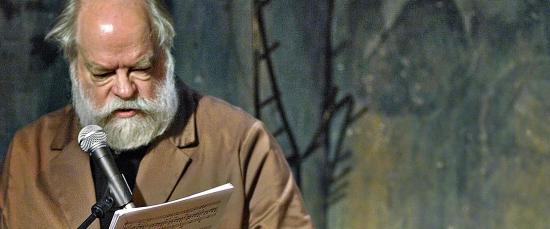
Riccardo Venturi, 11-3-2024 21:23
I Vietnam, i Vietnam
(continuer)
(continuer)
Natalia

Musica / music / sävellys: Caj Chydenius
Testo / lyrics / sanat: Elvi Sinervo
Elvi Sinervo (1912 - 1986), a Finnish writer and prolific translator, wrote this poem about her cellmate while in political inprisonment during World War II. Back then, Ukraine was occupied by Nazi Germany. Today, more than 70 years later, the message of the poem seems to be timely again.
The poem was composed by Kaj Chydenius and recorded by Agit Prop in the early 1970s.
Testo / lyrics / sanat: Elvi Sinervo
Elvi Sinervo (1912 - 1986), a Finnish writer and prolific translator, wrote this poem about her cellmate while in political inprisonment during World War II. Back then, Ukraine was occupied by Nazi Germany. Today, more than 70 years later, the message of the poem seems to be timely again.
The poem was composed by Kaj Chydenius and recorded by Agit Prop in the early 1970s.
Maa vieras on ja kylmä kevät sen
(continuer)
(continuer)
envoyé par Juha Rämö 18/3/2015 - 17:09
×
![]()
- Confronter avec l'originale
- Confronter avec une autre version
- Chercher Vidéo sur YouTube
- Chansons reliées

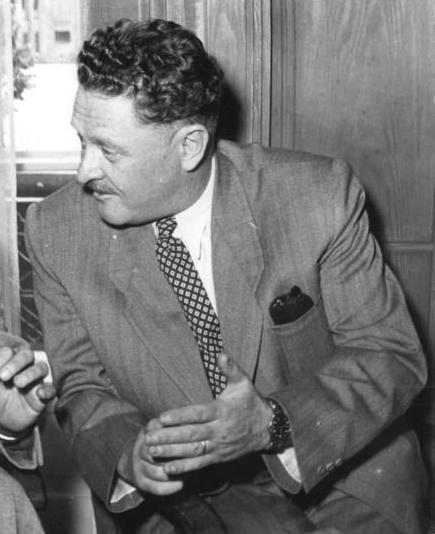



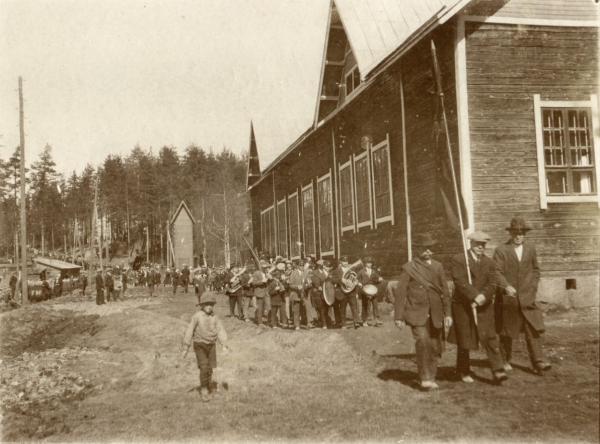
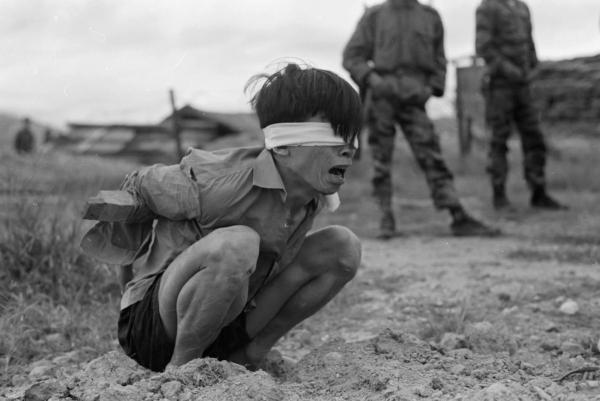
Musica / Music / Musique / Sävel: Eero Ojanen
Testo / Lyrics / Paroles / Sanat: Brita Polttila
Album /Albumi: Laulu kaikille
The lyrics of this song are based on lines written by Nâzım Hikmet in his 1962 autobiographical novel Yaşamak Güzel Şey Be Kardeşim, translated into English by Mutlu Konuk Blasing (1944-2021) and published in 2013 under the title Life's Good, Brother.
For most of his life, Hikmet was persecuted by the Turkish state for his political beliefs. His works were banned in Turkey until 1965. In 2017, 59 years after Hikmet's death, Yaşamak Güzel Şey Be Kardeşim was published by Yapı Kredi Publications, the current owner of Hikmet's copyrights, with a total of 25 parts of the text censored, including these very lines now reading »I'm a worker« instead of »I'm a communist«. So thank you, Mr. Erdoğan, for this and for your recent kind words about Finland and Sweden.